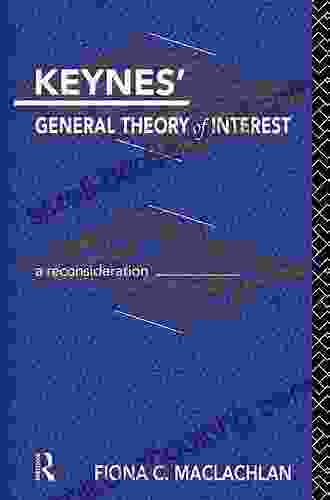Unlocking the Enigma of Economic Fluctuations: Delve into Keynes's Revolutionary "General Theory of Interest"

In the annals of economic thought, John Maynard Keynes's "General Theory of Interest" stands as a towering achievement, revolutionizing our understanding of economic fluctuations and shaping the course of modern economic policy. First published in 1936, this seminal work challenged prevailing classical theories, proposing a groundbreaking framework that continues to resonate today.
Keynes's General Theory departs from the classical notion that the economy will automatically self-correct towards full employment. Instead, he argues that it can become trapped in a state of underemployment, where businesses are unwilling to hire more workers and consumers lack the purchasing power to spur economic growth. This phenomenon, known as the "paradox of thrift," occurs when saving becomes excessive, leading to a shortfall in aggregate demand.
4.5 out of 5
| Language | : | English |
| File size | : | 1777 KB |
| Text-to-Speech | : | Enabled |
| Screen Reader | : | Supported |
| Enhanced typesetting | : | Enabled |
| Word Wise | : | Enabled |
| Print length | : | 196 pages |
To remedy this paradox, Keynes introduces the concept of "effective demand." This refers to the total spending in an economy, including consumption by households, investment by businesses, and government expenditure. Keynes argues that by increasing effective demand, governments can stimulate economic growth and reduce unemployment. He advocates for expansionary fiscal policy, where the government increases spending or cuts taxes, to boost aggregate demand.
Keynes's theory also sheds light on the role of interest rates. While classical economists believed that low interest rates would stimulate investment, Keynes argues that they may have little effect if businesses lack confidence. He proposes a "liquidity preference theory" that suggests individuals and businesses may prefer to hold cash when they anticipate economic uncertainty, reducing their willingness to invest or lend.
The "liquidity trap" is a crucial concept in Keynes's theory. It occurs when the central bank's interest rates are so low that further reductions have no effect on stimulating investment or boosting aggregate demand. In this situation, monetary policy becomes ineffective, leaving fiscal policy as the primary tool to address economic downturns.
Keynes's General Theory of Interest profoundly influenced economic thought and policymaking. It provided a theoretical framework for understanding the causes of economic fluctuations and guided governments in implementing policies to promote growth and stability. The book's insights continue to be relevant today, offering valuable guidance in navigating economic challenges and shaping economic policy.
Keynes's Legacy and the Enduring Value of His Theory
Keynes's General Theory of Interest has left an indelible mark on economics and continues to shape economic discourse. His ideas have informed the development of macroeconomic policies around the world, influencing the work of policymakers, economists, and financial institutions.
The theory's enduring value lies in its ability to explain economic crises and provide a framework for policy responses. During the Great Depression, Keynes's ideas helped governments understand the causes of the economic downturn and implement policies to stimulate growth. Similarly, in the aftermath of the 2008 financial crisis, Keynesian policies were widely adopted to stabilize the economy and prevent a deeper recession.
While Keynes's theory has been refined and expanded over the years, its core principles remain influential. Economists continue to study and debate Keynesian ideas, seeking to further our understanding of economic fluctuations and develop more effective policies. The General Theory of Interest remains a foundational text in economics, providing a deep understanding of the complexities of our economic system.
: Unveiling the Genius of Keynes's Masterpiece
Keynes's General Theory of Interest is an essential read for anyone seeking a comprehensive understanding of macroeconomics and economic fluctuations. Its groundbreaking ideas have transformed our understanding of how economies function and have profoundly influenced economic policy. By delving into this seminal work, readers will gain a deeper appreciation for the genius of Keynes and the enduring value of his economic theory.
Whether you are an economics student, a seasoned professional, or simply curious about the mysteries of economic fluctuations, Keynes's General Theory of Interest is an intellectual journey that will challenge your assumptions and expand your knowledge. Embrace the insights of this economic masterpiece and unlock the key to unlocking the enigma of economic fluctuations.
Call to Action
Secure your copy of Keynes's General Theory of Interest today and embark on an intellectual odyssey that will reshape your understanding of economics. This classic text is a must-have for any serious student of economics or anyone seeking a deeper insight into the complexities of our economic system.
Join the ranks of economists, policymakers, and business leaders who have been inspired by Keynes's groundbreaking ideas. Free Download your copy of General Theory of Interest now and unlock the secrets of economic fluctuations.
4.5 out of 5
| Language | : | English |
| File size | : | 1777 KB |
| Text-to-Speech | : | Enabled |
| Screen Reader | : | Supported |
| Enhanced typesetting | : | Enabled |
| Word Wise | : | Enabled |
| Print length | : | 196 pages |
Do you want to contribute by writing guest posts on this blog?
Please contact us and send us a resume of previous articles that you have written.
 Book
Book Novel
Novel Page
Page Chapter
Chapter Text
Text Story
Story Genre
Genre Reader
Reader Library
Library Paperback
Paperback E-book
E-book Magazine
Magazine Newspaper
Newspaper Paragraph
Paragraph Sentence
Sentence Bookmark
Bookmark Shelf
Shelf Glossary
Glossary Bibliography
Bibliography Foreword
Foreword Preface
Preface Synopsis
Synopsis Annotation
Annotation Footnote
Footnote Manuscript
Manuscript Scroll
Scroll Codex
Codex Tome
Tome Bestseller
Bestseller Classics
Classics Library card
Library card Narrative
Narrative Biography
Biography Autobiography
Autobiography Memoir
Memoir Reference
Reference Encyclopedia
Encyclopedia Robert Teigrob
Robert Teigrob Guy Windsor
Guy Windsor Thomas Nelson
Thomas Nelson Eric R Dodge
Eric R Dodge Eric Zandona
Eric Zandona Erik Daniel Shein
Erik Daniel Shein Eric Mosley
Eric Mosley Steve Martorano
Steve Martorano Joshua Partlow
Joshua Partlow Melissa D Burrage
Melissa D Burrage Eric Siegel
Eric Siegel L J Martin
L J Martin Jennifer A Lee
Jennifer A Lee Laurie Pickard
Laurie Pickard Marc Dipaolo
Marc Dipaolo Juliana Serafim
Juliana Serafim Isaac Fitzsimons
Isaac Fitzsimons Susan Orlean
Susan Orlean Terri Jean
Terri Jean Steve Heaney Mc
Steve Heaney Mc
Light bulbAdvertise smarter! Our strategic ad space ensures maximum exposure. Reserve your spot today!
 Julian PowellFollow ·18.4k
Julian PowellFollow ·18.4k Melvin BlairFollow ·10.5k
Melvin BlairFollow ·10.5k Morris CarterFollow ·2.7k
Morris CarterFollow ·2.7k Allen GinsbergFollow ·14.3k
Allen GinsbergFollow ·14.3k Blake KennedyFollow ·16.1k
Blake KennedyFollow ·16.1k Jerome PowellFollow ·10.9k
Jerome PowellFollow ·10.9k E.M. ForsterFollow ·8.6k
E.M. ForsterFollow ·8.6k Evan HayesFollow ·9.6k
Evan HayesFollow ·9.6k

 Roland Hayes
Roland HayesMagda: A Mother's Love, A Daughter's Redemption - A...
Immerse Yourself in the Captivating True Story...

 Spencer Powell
Spencer PowellSnow White Retold: A Tale of Love, Magic, and...
Once upon a time, in...

 Jake Powell
Jake PowellMaster the SATs with Effective Strategies from 99th...
The SATs are a challenging exam,...

 Brian Bell
Brian BellSEO for Dummies: Unlock the Secrets to Search Engine...
In today's digital...

 Jaylen Mitchell
Jaylen MitchellBechtel: Unveiling the Unsung Heroes Who Built the World
In the annals of global infrastructure, the...
4.5 out of 5
| Language | : | English |
| File size | : | 1777 KB |
| Text-to-Speech | : | Enabled |
| Screen Reader | : | Supported |
| Enhanced typesetting | : | Enabled |
| Word Wise | : | Enabled |
| Print length | : | 196 pages |














